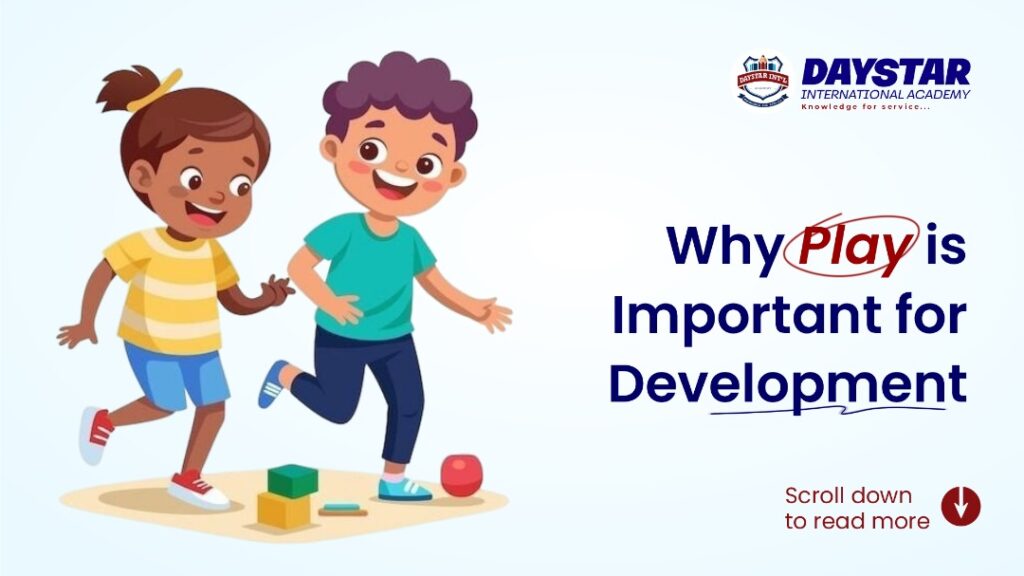
While play may appear to be a fun way for children to pass time or burn off energy, it’s actually a crucial part of their development. Play shapes the way children learn, think, and interact with the world, laying the foundation for essential skills they will use throughout their lives. Research reveals that play is more than just enjoyment; it’s a vital building block for cognitive, social, and emotional growth.
However, some parents believe that reading or structured learning is the only worthwhile activity for their children and may prefer that they spend more time on academics, seeing it as more productive than play. But while reading and formal learning are undoubtedly important, play offers unique benefits that reading alone cannot provide. Through play, children practice creativity, problem-solving, and social skills. Let’s look at the various ways in which play is essential for our children’s development;
- Builds Social Skills and Empathy:
When children play together, they learn important social skills such as sharing, cooperating, and seeing things from other people’s perspective. These interactions help them navigate social situations, understand social cues (like facial expressions or tone of voice), and develop empathy. Playing simple games also teaches kids to communicate, compromise, and respect boundaries. Games that involve teamwork like building with blocks or tug-of-war, naturally build these social skills.
- Enhances Creativity and Problem-Solving:
Play encourages children to explore and think in new ways. When they build with blocks or try to solve puzzles with friends, they are not just having fun; they’re learning to approach challenges creatively and find smart solutions. These playful activities stimulate their minds, building problem-solving skills and helping them think flexibly. You can do this by providing toys like art supplies or building sets which encourages creativity and allow kids to explore their imaginations. Let children try to solve simple problems while playing and when they make mistakes, teach them to try again.
- Supports Physical Development:
Active play like running, climbing, jumping, and other physical activities develops balance, coordination, and overall fitness. These physical abilities are important not only for sports or outdoor activities but also for everyday tasks like writing, dressing, and eating. Physical play also improves cardiovascular health and encourages a healthy lifestyle from an early age. Even simple backyard games or trips to the playground help children stay active and healthy.
- Boosts Cognitive Skills and Academic Readiness:
Play helps children develop cognitive skills like memory, attention, and self-regulation, which are essential for learning. Games that involve counting, sorting, or following instructions can enhance math and literacy skills. Even during free play, children engage in complex thought processes, exploring patterns, cause and effect, and decision-making. You can include games that challenge thinking like puzzles or board games, which can be both fun and intellectually stimulating.
- Strengthens Emotional Growth:
Through play, children learn to process emotions, manage frustrations, and build resilience. When they lose a game or face a challenging puzzle, they are learning to cope with disappointment and try again. These experiences strengthen their emotional growth and prepare them for life’s ups and downs. Encourage them to keep going even when things are tough; rather than stepping in right away, try to remember that these small moments of struggle can be incredibly valuable for their emotional growth.
- Promotes a Positive View of Learning:
When learning feels like play, children are more likely to develop a love for it. This is especially important as they grow older and face more structured educational environments. When children find learning fun, they are more eager to explore new things. For instance, if a child enjoys counting while playing, they’ll feel excited about using numbers in other situations too. So when teaching children at home or in school make it engaging and playful. Also, parents can turn everyday tasks into learning opportunities for their kids by counting items in the shopping cart or reading road signs together.
In summary, making time for play isn’t difficult, but it does require intentionality. Incorporating play into your child’s daily routine is essential for their well-rounded development. It nurtures cognitive, social, emotional, physical, and language skills, laying a strong foundation for their future. So, the next time your child asks to play, remember that you’re not just giving them some time to unwind; you’re investing in their growth and well-being. Embrace the power of play, and watch your child flourish in ways you never imagined. The benefits are truly remarkable.

